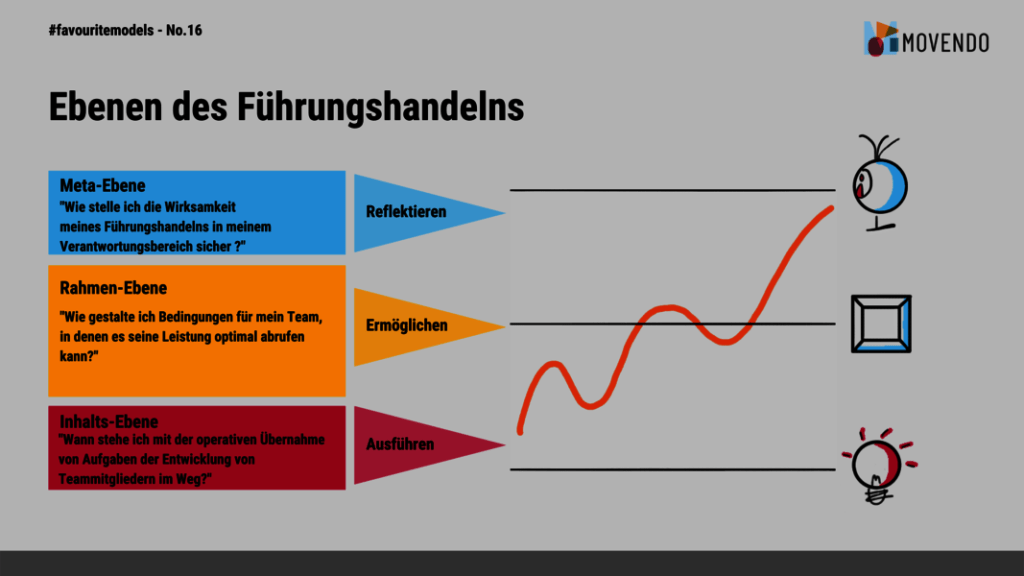#favouritemodel No. 16 – Levels of leadership action

Anyone who examines the nature of leadership inevitably comes up with the question: When and through which activities do I create added value in the team and for the organization through my leadership?
Especially in direct exchanges, I repeatedly encounter managers who describe the balancing act between taking on operational (specialist) tasks and their simultaneous responsibility for the good working environment of the team as the real challenge of their role.
In my view, a very helpful tool is to reflect on the different levels on which I can and should be effective as a manager. In this discussion, the influence that a conscious decision for one of the levels of action has on the success of leadership becomes clear at the same time.
Roll up your sleeves and lend a hand.
In my role as a manager, I can work and be effective at different levels. On the one hand, there is the operational level, where I make a concrete contribution to ensuring that tasks are completed and problems solved. This is where I roll up my sleeves and get stuck in. This is very much appreciated by some employees and also by some managers. After all, technical experts have often become managers. As a result, many patterns of expectation have become established that the manager must at least be on a par with the team in professional terms and, admittedly, some operational tasks are simply fun – especially if they suit me.
Shaping framework conditions.
However, my work as a manager must be different from the work of my employees. Otherwise, I would literally be taking away their space and therefore also the room for development. So if I am not operationally active as a manager, what am I doing? In #favoritemodel 1, I described that leadership means creating a framework in which others can perform. As a manager, I largely operate at the framework level. This is precisely where the difference lies and also the much greater value contribution that I can make as a manager. Instead of working operationally, I create the framework conditions that the team needs, develop goals, remove obstacles, create networks, set the rules and ensure that conflicts are resolved. My contribution can therefore lie in thinking and reflecting. It is important that I make this value contribution and its significance in the overall performance context clear to myself and others. Some organizations have a considerable need for development, especially when it comes to recognizing leadership performance, which makes it difficult for individuals to derive personal satisfaction from their leadership contribution. But this is precisely what is crucial for managers in order to develop their own potential and not stand in the way of their employees’ development.

Reflect on your own leadership actions.
The third level of action is the meta or helicopter level. We have already described the helicopter perspective in detail in #favoritemodel 4. In concrete leadership action, this level means reflecting regularly:
- What does my leadership need next in the context of my team?
- What strategic impetus do we need?
- How should I lead differently?
- What other culture do we need to achieve our goals and maintain our trusting relationship?
I regularly set a fixed block in my calendar to deal with these and similar questions.
Managers certainly bring added value at all three levels, which is why it makes little sense to say that managers should never work operationally. At the same time, the operational level has a certain pull effect, which is why it is important to consciously decide when to move to this level. The fact alone that there are usually already others there means that the framework and meta levels add significantly more value. In any case, it is important to consciously decide on which level I act as a manager and thus create the greatest added value in the respective situation.
How does my #favoritemodel help you?
I always have the image of the three different perspectives in my mind and it helps me a lot to decide what I focus on and my performance. I don’t always stay on one level, but I consciously decide when to become operational and have developed clear criteria for this.
What criteria help you decide on the operational level?
Leadership offers added value and in many cases it is only through leadership that the performance of others becomes possible. In the first step, it is important for me to recognize what contribution I make when I lead and to draw self-worth and recognition from this. In the second step, it is sometimes important to ensure that this performance is valued within your own environment and that it is not measured against operational expectations.
How do you ensure that you value your own leadership performance and that leadership itself is recognized in your environment?
Regular reflection on one’s own leadership is a significant added value. Especially when everyone else is drifting towards the operational level, it is crucial to regularly occupy this important level as well.
How do you create regular time to reflect on your leadership and the needs of your team?
Author

Marc Chmielewski
Managing Director




